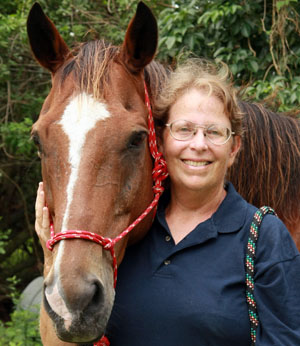Tales From The Trails
I’ve always been able to remember events in my life with great clarity, replaying many of them as if I was watching a movie. Big events and small, important and ordinary — especially the day one of my all-time dreams came true: buying my first horse.
I had worked and saved for years, building my bank account up to an incredible (for me) $1,000. It was 1971, I was in my second year of college, living at home with my mother and commuting daily to C.W. Post College on Long Island, which happened to have a stable on the grounds. By the time I had bought the horse for $600, paid $50 for shipping, $50 for the first month’s board (outside in a shelter-less pen), and bought some brushes, a halter and lead (blue nylon) and a bridle, I had $50 left. I borrowed saddles from the riding school or rode bareback.
When it came time for my horse to get shod, mom paid the $30. “This is a gift for the new horse,” she told me. “Don’t ask me for even one more penny. This is your horse. You have to pay for everything else.”
I did, working all sorts of jobs to keep him. But that’s not what this story is about. It’s about the man who shod my horse, along with virtually every other horse in that barn. He and his crew would arrive, put four horses in the crossties, and get down to work. One man (and they were all men back then) pulled off old shoes. One man trimmed hooves. One man shaped new shoes or adjusted old ones, while another nailed them on. It was a veritable assembly line of shoeing, and in no time, all the horses were done and the crew had packed up and left.
The farrier’s name was Billy Brennan. Now comes the small world part.
Fast forward to 2017. I was at a local barn, interviewing the owner, and we had found out we both grew up on Long Island. We began recalling the names of barns, owners, riders and horses, when she mentioned, “You should talk to the horseshoer working on my horses.” I had noticed him when I arrived, and now we walked back and shook hands. His name? Billy Brennan III, the son of the man I had known back in New York.
“My family were snow birds, originally,” he said. “I started helping my dad when I was little, 12 or 13. I always wanted to be just like him. I couldn’t concentrate on school, so I quit at 16 and worked with him full-time. He had a lot of guys working for him, but I was the best at pulling shoes and finishing feet. I never regretted my decision. I was making good money and loved what I was doing, being outside with horses all day. We worked a lot of barns, and there were some cute girls at those barns. We did a lot of hunters, jumpers and tons of polo horses. I’m lucky that I have a strong back. Dad always said a good farrier needs a strong back.”
Billy’s family sold their New York home and moved to South Florida permanently in 1980. They had been doing so many polo ponies in the winter that it made sense to follow the work. Billy calls himself a “horseshoer,” rather than farrier. He cautions against trying to do too much to change a horse’s natural hoof, explaining that it is best to keep things simple and make the horse comfortable. “Every hoof is different,” he said. “The horse lets you know what it needs.”
Billy tries to keep to the lessons his father taught him.
“I don’t do as many horses now as I used to, but there’s still enough work to keep me busy,” Billy said. “I think there are more horses in Wellington each winter than anywhere else in the country. I don’t do a lot of show horses. I prefer the year-round owners, mostly backyard horses and a few polo ponies. I charge reasonable rates, and I show up on time, like my dad. He built his business on being dependable.”
Kim Krogmann-Breier, owner of La Petite Cheval Farm, has been a client of Billy’s since her family moved to the area in 1994.
“No one else does our horses,” she said. “He’s very honest and has a good eye for a horse’s foot. He has seen it all and knows what he is doing. He shows up on time and does a great job. One time we got in a rescue horse with terrible feet, which hadn’t been done in years and had chronic abscesses. Billy worked out a plan that reduced the abscesses and had the feet shaped normally. I’d recommend him to anyone who wants a quality, reliable, honest horseshoer.”
Billy finished trimming the horse he was working on and straightened up with a smile. “Horses and the horse community have been very good to us over the years,” he said. “Carrying on dad’s work is very special.”
Billy and his family live in The Acreage. His wife is a real estate broker, and none of their four daughters are farriers. The line stops with him. Billy’s dad passed a few years back, but I’m sure he’s looking on, proud of the son who wanted to be just like him.
To contact Billy Brennan, call (561) 301-8984.








